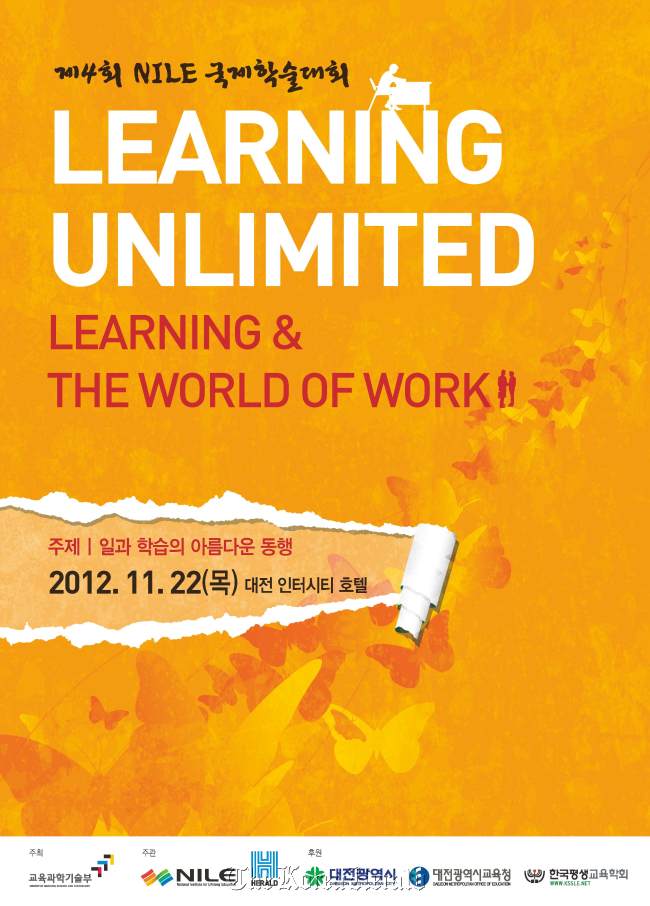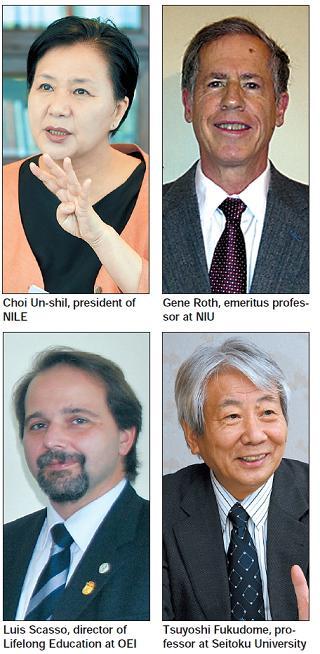Experts to explore future of lifelong learning
NILE to host international conference to discuss practices, key challenges
By Korea HeraldPublished : Nov. 21, 2012 - 20:13

Practitioners, academics and policy planners in lifelong learning will gather at an international forum in Daejeon on Thursday to share their experiences and discuss future challenges.
The fourth annual International Conference on Lifelong Learning is drawing over 120 experts from home and abroad to a debate under the theme of “Learning Unlimited: Learning and the World of Work.”
It is organized by the state-run National Institute for Lifelong Education in Korea in cooperation with The Korea Herald.
Countries around the world are striving to forge an efficient lifelong education model to meet the need for capacity building and job training for an aging population in the rich world, and the need for competent human resources for development in poor countries.
Advancing information technologies are broadening opportunities for education through ages and careers.
The conference will focus on how to improve learning outcomes for a better quality of life with participants sharing new ideas and promoting international cooperation, said Choi Un-shil, the president of NILE.

The conference was launched in 2009 as Korea seeks to learn from advanced countries and help spread the best practices across Asia and around the world.
Korea has also been promoting learning through ages and careers in an effort to reduce gaps in education and help prepare adults to adapt to fast changing environment and support their longer life.
“I believe this conference will provide a unique opportunity to learn from the advanced countries in lifelong learning and learn the genuine harmony of work and learning,” she said.
In the face of longer life expectancies and increasing globalization, skills and knowledge need to be regularly enhanced and updated, the organizer said.
Especially in a prolonged economic slowdown, the need for education to help unemployed college graduates land jobs and also help early retirees find new careers is becoming more important than ever, Choi said.
The speakers include some of the world’s top experts in the field. They are Gene Roth, emeritus professor of Northern Illinois University; Rika Yorozu, program specialist of UNESCO Institute for Lifelong Learning; Luis Scasso, director of Lifelong Education of Organization of Ibero-American States; Anu Konkarikoski, enterprise coordinator and project manager of Finland’s Tavastia Vocational College; Lawrence Tsui Po Fung, president of the East Asian Forum for Adult Education; Tsuyoshi Fukudome, professor at Seitoku University; and Kim Hyun-soo, researcher at Korea Research Institute for Vocational Education and Training.
Roth, who specializes in international adult education, will provide the conceptual framework of “learning how to learn” through his key note speech at the opening of the conference.
A series of presentations on various lifelong learning models in different countries will follow.
Scasso, who directs adult education programs for the Ibero-American states, will introduce recent trends from the 24 member countries, including Argentina, Brazil, Paraguay, Chile, and Colombia.
And Yorozu of UNESCO will present recent developments on lifelong learning in Europe, while Konkarikoski of Finland and Fukudome of Japan will offer case studies from their respective countries.
Kim Hyun-soo, senior researcher at the Korea Research Institute for Vocational Education and Training, will introduce Korea’s unique lifelong learning practices including its financing scheme and adult literacy programs.
“The adult literacy rate is still the biggest concern in many countries, and they are eager to learn from Korea how we quickly came out from illiteracy,” Choi, the chief of NILE, told The Korea Herald.
She also noted that many countries, especially the Latin American region are interested in adopting Korea’s Academic Credit Bank System.
The ACBS, which was introduced in 1997, is a unique educational system that is designed to recognize the diverse learning experiences of individuals acquired outside school.
It allows people to obtain a higher education degree equivalent to a university or college degree through different channels, such as completing courses accredited by the ACBS, passing an exam for self-education and acquiring certificates.
“The main purpose of the ACBS is to help more people engage in learning. And I think this system could be a useful tool for those countries with low school participation rates,” she said.
Korea is fast becoming an aged society ― where more than 14 percent of the population is 65 or older ― and people now need to consider a second job after retirement.
She pointed out that according to the latest happiness index published by OECD, the top five countries, including Denmark, Australia, Norway, Austria and Iceland are not only most advanced in economy, but also in lifelong learning.
“Korea ranked 32nd among 34 countries, and this shows that our journey to becoming a truly happy nation will face enormous challenges,” she said.
The conference will be held at the Hotel Interciti, in Daejeon, some 160 kilometers south of Seoul.
NILE will also host a special exhibition for lifelong learning following the annual conference. The exhibition, scheduled from Friday to Sunday at the Daejeon Convention Center, will invite more than 190 institutions across the country, the organizer said.
NILE was established in 2008 by integrating separate lifelong education agencies. It has been carrying out a wide range of projects, such as researching and developing education programs, training lifelong education staff and supporting regional institutes.
By Oh Kyu-wook (596story@heraldcorp.com)
-
Articles by Korea Herald








![[KH Explains] Hyundai's full hybrid edge to pay off amid slow transition to pure EVs](http://res.heraldm.com/phpwas/restmb_idxmake.php?idx=644&simg=/content/image/2024/04/18/20240418050645_0.jpg&u=20240419100350)







![[From the Scene] Monks, Buddhists hail return of remains of Buddhas](http://res.heraldm.com/phpwas/restmb_idxmake.php?idx=652&simg=/content/image/2024/04/19/20240419050617_0.jpg&u=20240419175937)

![[KH Explains] Hyundai's full hybrid edge to pay off amid slow transition to pure EVs](http://res.heraldm.com/phpwas/restmb_idxmake.php?idx=652&simg=/content/image/2024/04/18/20240418050645_0.jpg&u=20240419100350)

![[Today’s K-pop] Illit drops debut single remix](http://res.heraldm.com/phpwas/restmb_idxmake.php?idx=642&simg=/content/image/2024/04/19/20240419050612_0.jpg&u=)